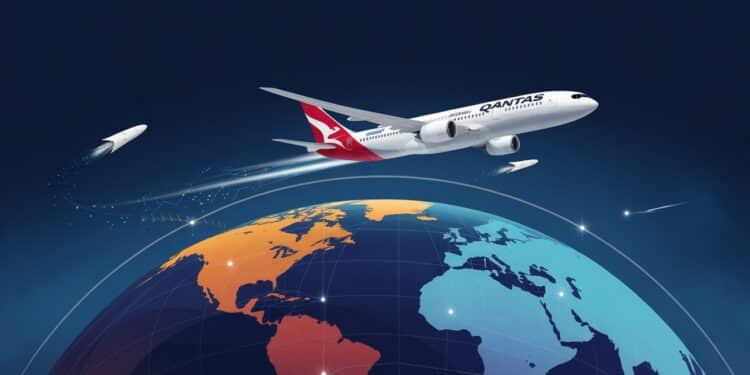In a startling revelation, Australian flagship carrier Qantas has disclosed that its flights to South Africa are facing unprecedented delays due to an unlikely culprit—falling debris from Elon Musk’s SpaceX rockets. This surprising development underscores the growing impact of the burgeoning commercial space industry on traditional aviation.
The SpaceX Effect: Rocket Debris Disrupts Qantas Operations
Ben Holland, the head of Qantas’ operations center, revealed that the airline has been forced to postpone several flights on its Sydney-Johannesburg route at the last minute. The reason? Advisories from the U.S. government warning of SpaceX rocket components reentering the Earth’s atmosphere over the southern Indian Ocean.
SpaceX, the pioneering space venture founded by billionaire entrepreneur Elon Musk, has chosen this remote expanse of ocean as its designated “reentry zone” for spent rocket stages. However, the unpredictable nature of these descents has left airlines like Qantas scrambling to adjust their schedules on short notice.
“Over the past few weeks we’ve had to delay several flights between Johannesburg and Sydney due to advice received from the US Government regarding the re-entry of SpaceX rockets over an extensive area of the Southern Indian Ocean.”
– Ben Holland, Head of Qantas Operations Centre
Navigating Uncertainty: The Challenges of Space Situational Awareness
While Qantas receives notifications specifying the geographic coordinates and timing of each rocket’s reentry, these estimates can change abruptly, sometimes just before a flight’s scheduled departure. This leaves the airline with little choice but to delay flights to ensure the safety of its passengers and crew.
Holland noted that customers generally understand that these disruptions are beyond the airlines’ control, recognizing that flights cannot be allowed to proceed through an area where a rocket reentry is occurring. Nevertheless, Qantas is actively engaging with SpaceX in an effort to refine the designated reentry zones and time windows, aiming to minimize future inconveniences for travelers on this popular route.
The New Normal? Aviation in the Age of Commercial Spaceflight
As the frequency of commercial space launches continues to increase, incidents like these may become more commonplace. The rapid growth of private spaceflight companies, led by trailblazers like SpaceX, is introducing new challenges for the aviation industry, which must now contend with the regular descent of rocket components in addition to traditional concerns like weather and air traffic congestion.
This development also highlights the need for enhanced space situational awareness and improved coordination between spaceflight operators and aviation authorities. As the skies become increasingly crowded with both aircraft and spacecraft, developing robust protocols for sharing information and mitigating potential hazards will be crucial to ensuring the safety and efficiency of global air travel.
Balancing Innovation and Inconvenience
While the disruptions caused by falling rocket debris are undoubtedly frustrating for airlines and passengers alike, they are also a testament to the rapid advancement of the commercial space sector. As companies like SpaceX continue to push the boundaries of what is possible in terms of reusable rocket technology and high-volume launches, some growing pains are perhaps inevitable.
For its part, Qantas remains committed to providing its customers with safe, reliable service, even in the face of these new challenges. As the airline works to navigate the uncertainties of the emerging space age, it serves as a remarkable case study in the complex interplay between cutting-edge innovation and the practicalities of day-to-day operations.
As the world watches this story unfold, it is clear that the impact of companies like SpaceX extends far beyond the realm of spaceflight itself. From the boardrooms of major airlines to the departure lounges of international airports, the ripple effects of the new space race are being felt in unexpected and often challenging ways. As we move forward into an era of unprecedented access to space, finding ways to balance the demands of innovation with the realities of life on Earth will be a critical task for industries and individuals alike.
One thing, however, remains certain: the story of Qantas and the SpaceX rocket debris is just the beginning of a new chapter in the long and fascinating history of human flight. As we continue to reach for the stars, we must also keep our feet planted firmly on the ground, ready to adapt and evolve in the face of new challenges and opportunities. Only by working together—space pioneers and airline operators, regulators and innovators—can we hope to navigate the uncharted skies of the 21st century and beyond.








